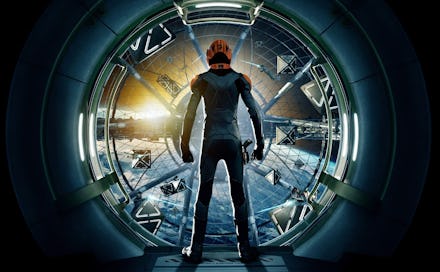'Ender's Game' Boycott: What Every Hater Needs to Remember

November 1 marks the movie release date of Ender's Game and the climax of a heated controversy regarding the author Orson Scott Card's personal beliefs and anti-homosexual activism. And while there is much to say about this controversy, Ender's Game has not only been a part of English classrooms and book clubs for 20 years, but it's also held an enduring place in the lives of many readers.
The millennial generation is probably the most connected to Ender Wiggins' series because most of us grew up with it in our libraries. Many even say that it was Card's engaging story and dynamic characters that first pulled them into reading for pleasure. To ignore the influence that Ender's Game has had on millions of young readers would be naïve, especially considering the tolerant and thought-provoking message of the book (hopefully mimicked by the film). Some have even argued that Orson Scott Card is the product of a different era — one in which the majority of Americans believed the same things that he did — and he has produced an engaging and enduring work of award-winning fiction with a positive message.
Similarly, history is full of artists who created beautiful worksdespite believing in reprehensible ideologies: Richard Wagner and Ezra Pound, for instance. Even Sean Connery, a fabulous actor, believes it's appropriate to hit a woman. In reality, there will always be products that we consume, despite the problematic viewpoints of those who are creating them. Do we therefore draw a line in every medium based on the ideologies of all kinds of creators?
Many readers have extolled the virtues of Ender's series, defended it, and are excitedly planning on seeing the film. Originally, Ender's Game was never intended as YA fiction (it just sort of accidentally ended up on that list), so in reading it many young readers got their first taste of bigger themes like the moral complexities of war and conflict. It's a book that led many into more mature fiction — or science fiction — or perhaps a more complex awareness of their real world. And we definitely have to give Ender's Game props for the way that it dealt with issues of, "us vs. them" and the alienation of others: the book is basically a how-to for interacting with entering new and confusing communities.
The question surfaces, then: are we forgiving negative and damaging political beliefs because of nostalgic attachment? Should we? Especially since it's been shown, time and again, that 70% of all millennials — even those who are more politically conservative — favor same-sex marriage?
As conscientious millennials, we will be faced with iterations of this issue for the rest of our lives, and the ways that we choose to interact with cultural output versus the creators of it will be a significant choice for us. I haven't yet decided whether I'll be going to see Ender's Game this November (even though it has the amazing Ben Kingsley), but I think that Gavin Hood, the director of the film, gave a pretty interesting argument in favor of the movie and the book, saying:
"The book is a fantastic book full of wonderful themes like compassion and tolerance and I am distressed by Orson's position on gay marriage …. I hold the opposite view. But I loved the book. … Would I prefer to be doing a movie without controversy? Yes, but I'm not in the least distressed that we are having this conversation. It is a very important conversation. It's just odd that our film, which is all about tolerance, has to be used to counter of the author."
Perhaps this will go down in history as another example of art bettering the system that created it.